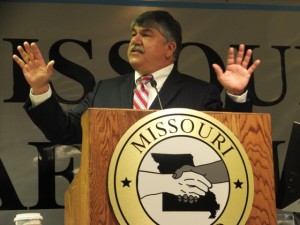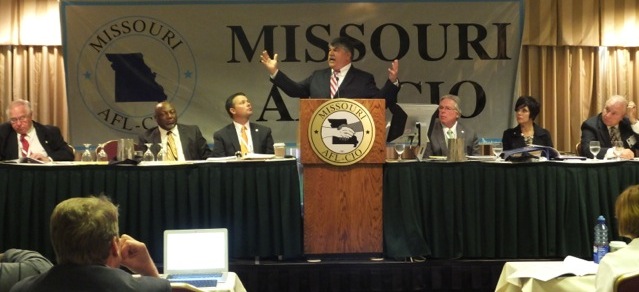
Critical year facing workers as leaders across Missouri meet, endorse Koster in 2016 Governor’s race
St. Louis- Keynoting the Missouri State AFL-CIO’s 27th Biennial Convention here Sept. 15, AFL-CIO President Richard Trumka gave a landmark speech on racism, the labor movement, attacks on working families and inequality in America.
“As a labor movement, we once again face concerted attacks by those who have enormous wealth,” Trumka said. “The far right is trying to divide us in many ways. But, here in in America, the power and dignity of working people will always win – as long as we stay united.”
(See video of the speech here.)
The convention took up more than two dozen resolutions ranging from consideration of a statewide per capita tax increase to fund on-going political needs to a resolution condemning Metro Transit, and demanding the resignation of Metro’s CEO John Nations for its ongoing dispute with the Transit Workers, who have not had a contract for four years, and allowing a senior staffer to flippantly inject race into the negotiations. (Editor’s Note: Amalgamated Transit Workers Local 788 reached a tentative deal with Metro as the convention drew to a close.)
Elections for state council president and secretary-treasurer were also held. No opposition was fielded for President Mike Louis who had been filling out the term of retired president Hugh McVey, and Secretary-Treasurer Jake Hummel, the Missouri House of Representatives Minority Floor Leader.
As one of its first orders of business, the Missouri AFL-CIO unanimously endorsed Attorney General Chris Koster as the Democratic candidate for Missouri governor. The delegates applauded Koster’s efforts on behalf of working people across the state throughout his entire career.
Key political leaders, including Gov. Jay Nixon and Secretary of State Jason Kander, St. Louis Mayor Francis Slay, U.S. Sen. Claire McCaskill, Democratic nominee for County Executive Steve Stenger and State Sen. Gina Walsh (D-Bellefontaine Neighbors), president of the Missouri State Building & Construction Trades Council, addressed approximately 200 delegates from locals across Missouri.
International Association of Machinists President Thomas Buffenbarger also addressed convention delegates.
Further details of the convention will be reported in the Labor Tribune’s Sept. 25 and Oct. 8 print editions.
UNION FAMILY TRAGEDY
Trumka strayed from his usual convention speech to talk about race and, in the wake of the police shooting of unarmed Ferguson teenager Michael Brown and the unrest and underlying problems that incident exposed, what role labor can and must play in addressing racial and economic inequality in Ferguson and throughout the country.
“How can we not be involved?” Trumka asked. “Union members’ lives have been profoundly damaged in ways that cannot be fixed. Lesley McSpadden, Michael Brown’s mother, who works in a grocery store, is our sister, an AFL-CIO union member. And Darren Wilson, the officer who killed Michael Brown, is a union member too, and he is our brother.
“Our brother killed our sister’s son, and we do not have to wait for the judgment of prosecutors or courts to tell us how terrible this is.
HISTORY OF RACISM
Without prejudging the specifics of the case, or denying Officer Wilson or any other officer, his or her rights on the job and in the courts, Trumka said, the labor movement must clearly and openly discuss the reality of racism in America.
‘We cannot wash our hands of the issues,” Trumka said. “Racism is part of our inheritance as Americans. Every city, every state and every region of this country has its own deep history with racism. And so does the labor movement.”
RACISM IN ST. LOUIS
In 1917, when powerful corporations in St. Louis replaced white strikers with African American workers, recruited from the Mississippi Delta with offers of wages far higher than anyone could make sharecropping, the St. Louis labor movement helped lead a blood bath against the African American community in East St. Louis.
Two hundred men, women and children were killed, and houses and businesses were burned, leaving 6,000 homeless.
Eugene Debs, the founder of the National Railway Union, called the East St. Louis massacre “a foul blot on the American labor movement.”
“It was one of the single most violent events in the history of American racism, and it scarred this city, our labor movement, and our country,” Trumka said.
A BETTER WAY
“We are here today because labor leaders like A. Philip Randolph and Walter Reuther showed us there was a better way not just for our unions, but for our country,” Trumka said.
“We as a movement have not always done our best to support our brothers and sisters of color who face challenges both on and off the job –– challenges that you don’t really understand unless you live them,” Trumka said.
“The test of our movement’s commitment to our legacy is not whether we post Dr. King’s picture in our union halls, it is whether we take up his fight when the going gets tough, when the fight gets real against the evils that still exist today.”
Standing up for the new immigrant mistreated by management because he doesn’t speak the language, speaking out for the African American worker denied a promotion or fair pay because of the color of his skin, demanding equal pay for women who are paid less than men for the same work, “We cannot afford to have ‘my issues’ and ‘your issue,’ ” Trumka said. “We must ALL stand together and mobilize around OUR ISSUES.”
COLLECTIVE ACTION
Those issues are coalescing, Trumka said, in a rising tide of dissent.
“For 40 years, we’ve been living a story of decline as so much of what made our nation great has been pushed into disrepair, as our roads and bridges crumble and fall away, and as public investment in social services, public education, housing, transportation research and medicine has been cut so politicians can give more tax cuts to the super-rich.”
That’s changing, he said.
“Working people are coming together, standing together, in the workplace and in the polling place and in the streets. People are talking about collective action and economic inequality.
Trumka cited fast food workers demanding fairness, dignity and $15 an hour, Walmart workers standing up to the richest family and the largest private employer in the world, St. Louis’s Metro workers demanding a fair contract and a long overdue raise, and the bipartisan coalition that banded together in this legislative session to defeat right-to-work.
The next step, he said, is to take it to the voting booth.
“When we stand together and fight together,” Trumka said. “We win together!”


